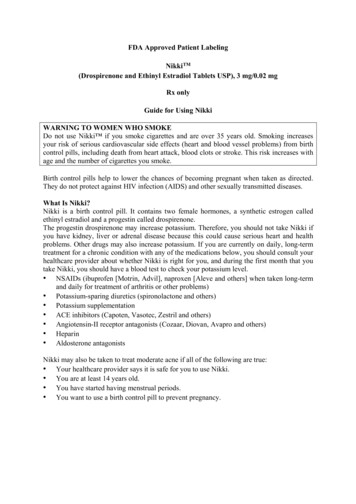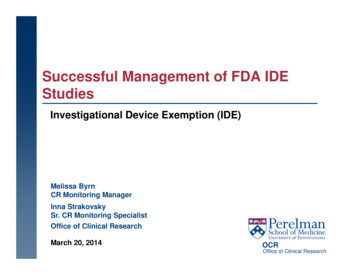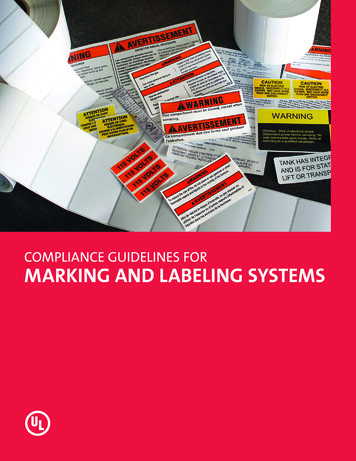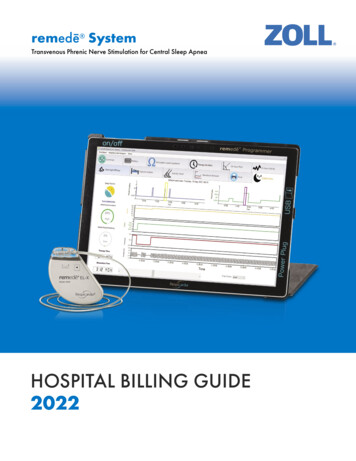
Transcription
FDA Approved Patient LabelingNikkiTM(Drospirenone and Ethinyl Estradiol Tablets USP), 3 mg/0.02 mgRx onlyGuide for Using NikkiWARNING TO WOMEN WHO SMOKEDo not use Nikki if you smoke cigarettes and are over 35 years old. Smoking increasesyour risk of serious cardiovascular side effects (heart and blood vessel problems) from birthcontrol pills, including death from heart attack, blood clots or stroke. This risk increases withage and the number of cigarettes you smoke.Birth control pills help to lower the chances of becoming pregnant when taken as directed.They do not protect against HIV infection (AIDS) and other sexually transmitted diseases.What Is Nikki?Nikki is a birth control pill. It contains two female hormones, a synthetic estrogen calledethinyl estradiol and a progestin called drospirenone.The progestin drospirenone may increase potassium. Therefore, you should not take Nikki ifyou have kidney, liver or adrenal disease because this could cause serious heart and healthproblems. Other drugs may also increase potassium. If you are currently on daily, long-termtreatment for a chronic condition with any of the medications below, you should consult yourhealthcare provider about whether Nikki is right for you, and during the first month that youtake Nikki, you should have a blood test to check your potassium level. NSAIDs (ibuprofen [Motrin, Advil], naproxen [Aleve and others] when taken long-termand daily for treatment of arthritis or other problems) Potassium-sparing diuretics (spironolactone and others) Potassium supplementation ACE inhibitors (Capoten, Vasotec, Zestril and others) Angiotensin-II receptor antagonists (Cozaar, Diovan, Avapro and others) Heparin Aldosterone antagonistsNikki may also be taken to treat moderate acne if all of the following are true: Your healthcare provider says it is safe for you to use Nikki. You are at least 14 years old. You have started having menstrual periods. You want to use a birth control pill to prevent pregnancy.
How Well Does Nikki Work?Your chance of getting pregnant depends on how well you follow the directions for takingyour birth control pills. The better you follow the directions, the less chance you have ofgetting pregnant.Based on the results of one clinical study, 1 to 2 women out of 100 women, may get pregnantduring the first year they use Nikki.The following chart shows the chance of getting pregnant for women who use differentmethods of birth control. Each box on the chart contains a list of birth control methods thatare similar in effectiveness. The most effective methods are at the top of the chart. The boxon the bottom of the chart shows the chance of getting pregnant for women who do not usebirth control and are trying to get pregnant.
How Do I Take Nikki?1. Be sure to read these directions before you start taking your pills or anytime you are notsure what to do.2. The right way to take the pill is to take one pill every day at the same time in the orderdirected on the package. Preferably, take the pill after the evening meal or at bedtime,with some liquid, as needed. Nikki can be taken without regard to meals.If you miss pills you could get pregnant. This includes starting the pack late. The morepills you miss, the more likely you are to get pregnant. See “WHAT TO DO IF YOUMISS PILLS” below.3. Many women have spotting or light bleeding at unexpected times, or may feel sick totheir stomach during the first 1 to 3 packs of pills.If you do have spotting or light bleeding or feel sick to your stomach, do not stop takingthe pill. The problem will usually go away. If it does not go away, check with yourhealthcare provider.4. Missing pills can also cause spotting or light bleeding, even when you make up thesemissed pills.On the days you take two pills, to make up for missed pills, you could also feel a littlesick to your stomach.5. If you have vomiting (within 3 to 4 hours after you take your pill), you should follow theinstructions for “WHAT TO DO IF YOU MISS PILLS”. If you have diarrhea or if youtake certain medicines, including some antibiotics and some herbal products such as St.John’s Wort, your pills may not work as well.Use a back-up method (such as condoms and spermicides) until you check with yourhealthcare provider.6. If you have trouble remembering to take the pill, talk to your healthcare provider abouthow to make pill-taking easier or about using another method of birth control.7. If you have any questions or are unsure about the information in this leaflet, callyour healthcare provider.Before You Start Taking Your Pills1. Decide What Time of Day You Want to Take Your PillIt is important to take Nikki in the order directed on the package at the same time everyday, preferably after the evening meal or at bedtime, with some liquid, as needed. Nikkican be taken without regard to meals.2. Look at Your Pill Pack - It has 28 PillsThe Nikki-pill pack has 24 pink pills (with hormones) to be taken for 24 days, followedby 4 white to off-white pills (without hormones) to be taken for the next four days.3. Also look for:a) Where on the pack to start taking pills,b) In what order to take the pills (follow the arrows)
4. Be sure you have ready at all times (a) another kind of birth control (such as condoms andspermicides) to use as a back-up in case you miss pills, and (b) an extra, full pill pack.When to Start the First Pack of PillsYou have a choice for which day to start taking your first pack of pills. Decide with yourhealthcare provider which is the best day for you. Pick a time of day which will be easy toremember.Day 1 Start:1. Take the first pink pill of the pack during the first 24 hours of your period.2. You will not need to use a back-up method of birth control, since you are starting the pillat the beginning of your period. However, if you start Nikki later than the first day ofyour period, you should use another method of birth control (such as a condom andspermicide) as a back-up method until you have taken 7 pink pills.Sunday Start:1. Take the first pink pill of the pack on the Sunday after your period starts, even if you arestill bleeding. If your period begins on Sunday, start the pack that same day.2. Use another method of birth control (such as a condom and spermicide) as a back-upmethod if you have sex anytime from the Sunday you start your first pack until the nextSunday (7 days). This also applies if you start Nikki after having been pregnant, and youhave not had a period since your pregnancy.When You Switch From a Different Birth Control PillWhen switching from another birth control pill, Nikki should be started on the same day thata new pack of the previous birth control pill would have been started.When You Switch From Another Type of Birth Control MethodWhen switching from a transdermal patch or vaginal ring, Nikki should be started when thenext application would have been due. When switching from an injection, Nikki should bestarted when the next dose would have been due. When switching from an intrauterinecontraceptive or an implant, Nikki should be started on the day of removal.What to Do During the Month
1. Take one pill at the same time every day until the pack is empty.Do not skip pills even if you are spotting or bleeding between monthly periods or feelsick to your stomach (nausea).Do not skip pills even if you do not have sex very often.2. When you finish a pack of pills, start the next pack on the day after your last white to offwhite pill. Do not wait any days between packs.What to Do if You Miss PillsIf You Miss 1 Pink Pill of Your Pack:1. Take it as soon as you remember. Take the next pill at your regular time. This means youmay take two pills in one day.2. You do not need to use a back-up birth control method if you have sex.If You Miss 2 Pink Pills In a Row in Week 1 or Week 2 of Your Pack:1. Take two pills on the day you remember and two pills the next day.2. Then take one pill a day until you finish the pack.3. You could become pregnant if you have sex in the 7 days after you restart your pills. Youmust use another birth control method (such as a condom and spermicide) as a back-upfor those 7 days.If You Miss 2 Pink Pills in a Row in Week 3 or Week 4 of Your Pack:1. If You are a Day 1 Starter:Throw out the rest of the pill pack and start a new pack that same day.If You are a Sunday Starter:Keep taking one pill every day until Sunday. On Sunday, throw out the rest of the packand start a new pack of pills that same day.2. You could become pregnant if you have sex in the 7 days after you restart your pills. Youmust use another birth control method (such as a condom and spermicide) as a back-upfor those 7 days.3. You may not have your period this month but this is expected. However, if you miss yourperiod two months in a row, call your healthcare provider because you might be pregnant.If You Miss 3 or More Pink Pills in a Row During Any Week:1. If you are a Day 1 Starter:Throw out the rest of the pill pack and start a new pack that same day.If You are a Sunday Starter:Keep taking 1 pill every day until Sunday. On Sunday, throw out the rest of the pack andstart a new pack of pills that same day.2. You could become pregnant if you have sex in the 7 days after you restart your pills. Youmust use another birth control method (such as condoms and spermicides) as a back-upfor those 7 days.3. Call your healthcare provider if you miss your period, because you might be pregnant.If You Miss any of the 4 White to off-White Pills in Week 4:Throw away the pills you missed.Keep taking one pill each day until the pack is empty.You do not need a back-up method.Finally, if You Are Still Not Sure What to Do About the Pills You Have Missed:Use a back-up method (such as condoms and spermicides) anytime you have sex.Contact your healthcare provider and continue taking one active pink pill each day until
otherwise directed.Who Should Not Take Nikki?Your healthcare provider will not give you Nikki if you: Ever had blood clots in your legs (deep vein thrombosis), lungs (pulmonary embolism),or eyes (retinal thrombosis) Ever had a stroke Ever had a heart attack Have certain heart valve problems or heart rhythm abnormalities that can cause bloodclots to form in the heart Have an inherited problem with your blood that makes it clot more than normal Have high blood pressure that medicine can't control Have diabetes with kidney, eye, nerve, or blood vessel damage Ever had certain kinds of severe migraine headaches with aura, numbness, weakness orchanges in vision Ever had breast cancer or any cancer that is sensitive to female hormones Have liver disease, including liver tumors Take any Hepatitis C drug combination containing ombitasvir/paritaprevir/ritonavir,with or without dasabuvir. This may increase levels of the liver enzyme “alanineaminotransferase” (ALT) in the blood. Have kidney disease Have adrenal diseaseAlso, do not take birth control pills if you: Smoke and are over 35 years old Are or suspect you are pregnantBirth control pills may not be a good choice for you if you have ever had jaundice (yellowingof the skin or eyes) caused by pregnancy (also called cholestasis of pregnancy).Tell your healthcare provider if you have ever had any of the above conditions (yourhealthcare provider can recommend another method of birth control).What Else Should I Know about Taking Nikki?Birth control pills do not protect you against any sexually transmitted disease, including HIV,the virus that causes AIDS.Do not skip any pills, even if you do not have sex often.If you miss a period, you could be pregnant. However, some women miss periods or havelight periods on birth control pills, even when they are not pregnant. Contact your healthcareprovider for advice if you: Think you are pregnant Miss one period and have not taken your birth control pills every day Miss two periods in a rowBirth control pills should not be taken during pregnancy. However, birth control pills takenby accident during pregnancy are not known to cause birth defects.You should stop Nikki at least four weeks before you have major surgery and not restart it
until at least two weeks after the surgery due to an increased risk of blood clots.If you are breastfeeding, consider another birth control method until you are ready to stopbreastfeeding. Birth control pills that contain estrogen, like Nikki, may decrease the amountof milk you make. A small amount of the pill's hormones pass into breast milk.If you have vomiting or diarrhea, your birth control pills may not work as well. Use anotherbirth control method, like condoms and a spermicide, until you check with your healthcareprovider.If you are scheduled for any laboratory tests, tell your doctor you are taking birth-controlpills. Certain blood tests may be affected by birth-control pills.Tell your healthcare provider about all the medicines you take, including prescription andover-the-counter medicines, vitamins and herbal supplements.Nikki may affect the way other medicines work, and other medicines may affect how wellNikki works. Know the medicines you take.Keep a list of them to show your healthcare provider and pharmacist when you get a newmedicine.What are the Most Serious Risks of Taking Birth Control Pills?Like pregnancy, birth control pills increase the risk of serious blood clots (see followinggraph), especially in women who have other risk factors, such as smoking, obesity, or agegreater than 35. This increased risk is highest when you first start taking birth control pillsand when you restart the same or different birth control pills after not using them for a monthor more. Women who use birth control pills with drospirenone (like Nikki) may have a higherrisk of getting a blood clot. Some studies reported that the risk of blood clots was higher forwomen who use birth control pills that contain drospirenone than for women who use birthcontrol pills that do not contain drospirenone.Talk with your healthcare provider about your risk of getting a blood clot beforedeciding which birth control pill is right for you.It is possible to die or be permanently disabled from a problem caused by a blood clot, suchas a heart attack or a stroke. Some examples of serious clots are blood clots in the: Legs (deep vein thrombosis or DVT) Lungs (pulmonary embolus or PE) Eyes (loss of eyesight) Heart (heart attack) Brain (stroke)To put the risk of developing a blood clot into perspective: If 10,000 women who are notpregnant and do not use birth control pills are followed for one year, between 1 and 5 of thesewomen will develop a blood clot. The figure below shows the likelihood of developing aserious blood clot for women who are not pregnant and do not use birth control pills, forwomen who use birth control pills, for pregnant women, and for women in the first 12 weeksafter delivering a baby.
Likelihood of Developing a Serious Blood ClotA few women who take birth control pills may get: High blood pressure Gallbladder problems Rare cancerous or noncancerous liver tumorsAll of these events are uncommon in healthy women.Call your healthcare provider right away if you have: Persistent leg pain Sudden shortness of breath Sudden blindness, partial or complete Severe pain in your chest Sudden, severe headache unlike your usual headaches Weakness or numbness in an arm or leg, or trouble speaking Yellowing of the skin or eyeballsWhat are the Common Side Effects of Birth Control Pills?The most common side effects of birth control pills are: Spotting or bleeding between menstrual periods Nausea Breast tenderness HeadacheThese side effects are usually mild and usually disappear with time.Less common side effects are:
AcneLess sexual desireBloating or fluid retentionBlotchy darkening of the skin, especially on the faceHigh blood sugar, especially in women who already have diabetesHigh fat (cholesterol; triglyceride) levels in the bloodDepression, especially if you have had depression in the past. Call your healthcareprovider immediately if you have any thoughts of harming yourself.Problems tolerating contact lensesWeight changesThis is not a complete list of possible side effects. Talk to your healthcare provider if youdevelop any side effects that concern you. You may report side effects to the FDA at1-800-FDA-1088.No serious problems have been reported from a birth control pill overdose, even whenaccidentally taken by children.Do Birth Control Pills Cause Cancer?Birth control pills do not seem to cause breast cancer. However, if you have breast cancernow, or have had it in the past, do not use birth control pills because some breast cancers aresensitive to hormones.Women who use birth control pills may have a slightly higher chance of getting cervicalcancer. However, this may be due to other reasons such as having more sexual partners.What Should I Know about My Period when Taking Nikki?Irregular vaginal bleeding or spotting may occur while you are taking Nikki. Irregularbleeding may vary from slight staining between menstrual periods to breakthrough bleeding,which is a flow much like a regular period. Irregular bleeding occurs most often during thefirst few months of oral contraceptive use, but may also occur after you have been taking thepill for some time. Such bleeding may be temporary and usually does not indicate any seriousproblems. It is important to continue taking your pills on schedule. If the bleeding occurs inmore than one cycle, is unusually heavy, or lasts for more than a few days, call yourhealthcare provider.Some women may not have a menstrual period but this should not be cause for alarm as longhas you have taken the pills according to direction.What if I Miss My Scheduled Period when Taking Nikki?It is not uncommon to miss your period. However, if you miss two periods in a row or missone period when you have not taken your birth control pills according to directions, call yourhealthcare provider. Also notify your healthcare provider if you have symptoms of pregnancysuch as morning sickness or unusual breast tenderness. It is important that your healthcareprovider checks you to find out if you are pregnant. Stop taking Nikki if you are pregnant.What If I Want to Become Pregnant?You may stop taking the pill whenever you wish. Consider a visit with your healthcareprovider for a pre-pregnancy checkup before you stop taking the pill.
General Advice about NikkiYour healthcare provider prescribed Nikki for you. Please do not share Nikki with anyoneelse. Keep Nikki out of the reach of children.If you have concerns or questions, ask your healthcare provider. You may also ask yourhealthcare provider for a more detailed label written for medical professionals.Nikki is a trademark of Lupin Pharmaceuticals, Inc.The other brands listed are trademarks of their respective owners and are not trademarks ofLupin Pharmaceuticals, Inc. The makers of these brands are not affiliated with and do notendorse Lupin Pharmaceuticals, Inc. or its products.Distributed by:Lupin Pharmaceuticals, Inc.Baltimore, Maryland 21202United StatesManufactured byLupin LimitedPithampur (M.P.) – 454 775INDIAJanuary 2018ID: 253437
spermicide) as a back-up method until you have taken 7 pink pills. Sunday Start: 1. Take the first pink pill of the pack on the Sunday after your period starts, even if you are still bleeding. If your period begins on Sunday, start the pack that same day. 2. Use another method of birth control (such as a condom and spermicide) as a back-up










